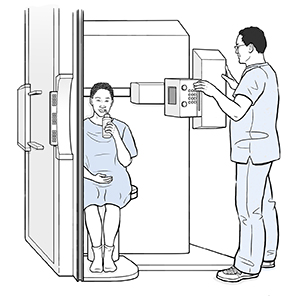Modified Barium Swallow
A modified barium swallow (also called a videofluoroscopic swallowing exam) is a test that checks your ability to swallow different consistencies of fluids and solid materials. It also helps in planning treatment, if needed. During the test, a substance called barium is mixed with a variety of materials that you will swallow. The material mixed with barium lets the healthcare providers see the parts involved with swallowing (the tongue, mouth, throat, and esophagus) clearly on X-rays. The test is needed if you have problems swallowing and are at risk of choking or food or liquid going into the lungs (aspiration). It's also needed if you have a feeding tube and your healthcare provider wants to check whether you can go back to eating by mouth.
What happens before the test?
-
Let your healthcare provider know of any medicines you’re taking. This includes vitamins, herbs, and over-the-counter medicines. You may be told to stop certain medicines in the days before the test.
-
Stop eating and drinking 4 hours before the test.
-
Follow any other instructions given by your healthcare provider.
Let the technologist know
For your safety, let the technologist know if you:
-
Are taking any medicines
-
Had recent X-rays or tests involving barium
-
Had recent surgery
-
Have other health problems, especially those affecting the lungs
-
Have any allergies
-
Are pregnant or may be pregnant
What happens during the test?
The test takes place in an X-ray department. It’s done by a speech therapist or feeding specialist. These people are trained to help you with swallowing or feeding problems. A radiology technologist is also present. A radiologist will be present as well. A radiologist is a healthcare provider who specializes in the diagnosis of disease and injury by interpreting medical imaging such as X-rays.

-
You’ll likely be seated in a special chair that is next to an X-ray table. The X-ray table is set upright.
-
You’re given tiny amounts of foods and liquids of different textures to swallow. This may include thin liquids (such as water) or thick liquids (such as milk). You may also be given soft foods (such as pudding). The foods and liquids contain a small amount of barium.
-
The speech pathologist or feeding specialist watches your swallowing. You’re observed carefully for signs of problems as each food or liquid is swallowed. If problems do occur as you’re swallowing, steps are quickly taken to treat these problems.
-
An X-ray video is also taken as each food or liquid is swallowed. The barium in the foods and liquids shows up clearly on the video.
What happens after the test?
-
You may become constipated after the test. This is due to the barium. If you can drink liquids, drinking water may help prevent constipation.
-
Your stool will appear chalky white or light for 1 to 2 days. This is a sign of the barium passing from your system.
When to call your healthcare provider
Call your healthcare provider if:
Follow-up care
The X-ray video and notes from the test are studied by the healthcare providers that were present for your test. These results are then discussed with your main healthcare provider. Your healthcare provider will meet with you to go over the results. You’ll be advised about what foods or liquids are safe for you. In severe cases of swallowing disorder, it won’t be possible for you to eat or drink safely. This means you’ll need a feeding tube if you don’t already have one. Your healthcare provider can tell you more about this if needed.
What are the risks and complications?
Risks and possible complications of a modified barium swallow include:
-
Liquid going into the lungs (aspiration)
-
Radiation exposure from X-rays
-
Blockage of the bowel due to retained barium
-
Allergic reaction to the barium